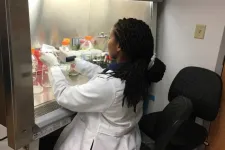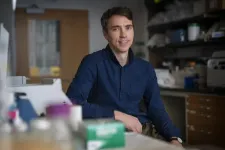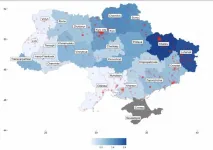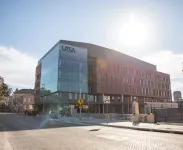(Press-News.org) In addition to being one of the largest, most diverse metropolitan areas in the world with a population of 6.1 million, South Florida hosts more than 9.7 million acres of farmland with a revenue of more than $7 billion in recent years. However, climate change, extreme weather events, poor soils, pests and disease, and workforce shortages present unique challenges in this region.
To address a critical need to train a diverse workforce with new sets of tools and skills to confront these emerging challenges, Florida Atlantic University, in collaboration with Florida International University, has received a four-year, $1 million grant from the United States Department of Agriculture’s (USDA) National Institute of Food and Agriculture (NIFA) to establish South Florida’s first-of-its-kind FAU Microbiome Innovation Center.
The program, “Building Capacity in Microbiome Innovation for Plant Health, Soil Fertility and Environmental Sustainability,” is the first workforce-development USDA-NIFA grant to a research-intensive Hispanic-Serving Institution, which will help address the complex challenges facing traditional agriculture and declining interest of the next generation in food, agriculture and natural resources careers.
“Growing challenges of food safety, biosecurity and agricultural productivity, or emergence of new pathogens such as citrus greening devastation, plant invasion, climate change and depletion of soil fertility, all have a microbiome undertone that needs to be promptly addressed by training competent cross-disciplinary professionals,” said Nwadiuto Esiobu, Ph.D., project director, a professor of biological sciences, and director of the Esiobu Microbial Biotech Laboratory within FAU’s Charles E. Schmidt College of Science. “In virtually every field of science, microbiomes are emerging as key priority themes.”
The FAU Microbiome Innovation Center will develop a new curriculum in wholistic plant health and embark upon creating a culture collection of indigenous beneficial bacteria whose many applications are at the nexus of environmental, agricultural and public health. The project will integrate soft skill development, stipends, and multi-tiered mentoring with experiential learning in cutting-edge microbiomes research.
The center will engage underrepresented undergraduate and graduate students from FAU and FIU and develop an innovative curriculum that will include plant microbiomes, plant biotechnology, microbial ecology and soil microbiology. The grant will procure a bench top DNA sequencer to drive development of a curated collection of indigenous beneficial microbes from South Florida. FAU and FIU undergraduate and graduate students will participate in isolating, sequencing and curating their strains as part of the research experiential programs. The collection will become a valuable asset in customizing probiotics for specific plants in specific ecologies such as wetland grasses, which are experiencing salinity and flooding stress. Currently, there is no such collection in the region.
Experiential learning activities will include novel advanced knowledge in genomics, microbial interactions, ecology, soil fertility, plant bioengineering and sequencing technologies. In addition, the project team will develop mini-pathways, fieldtrips, workshops, summer camps and additional specialized trainings.
The project team includes Krish Jayachandran, Ph.D., co-director and Distinguished University Professor and co-director of the agroecology program in FIU’s College of Arts, Sciences and Education; Evelyn Marques Frazier, Ph.D., university instructor; and Xing-Hai Zhang, Ph.D., a professor, both in the Department of Biological Sciences within FAU’s Charles E. Schmidt College of Science; and Kateel G. Shetty, Ph.D., a research assistant professor in FIU’s College of Arts, Sciences and Education.
The team’s combined expertise includes microbiology and microbial physiology, plant microbe interactions, biotechnology, genomics, environmental and public health, plant pests and ecology, animal health, soil fertility, and plant production with intersecting research interests in emerging fields of synthetic microbiome communities and defense against pathogens and abiotic stress.
The FAU Microbiome Innovation Center will partner with various entities including the Farm Credit Council, several USDA agencies and FAU’s Office of Undergraduate Research and Inquiry. The integrative and collaborative nature of the program fosters an ideal space for inquiry and discovery, facilitating the convergence of different perspectives that invariably promotes understanding and learning.
“The establishment of the FAU Microbiome Innovation Center will significantly enhance teaching and learning at both of our institutions,” said Valery Forbes, Ph.D., dean, FAU Charles E. Schmidt College of Science. “Students will experience firsthand applications of emerging technologies working in faculty mentors’ labs, at internship visits with our partners and shadowing USDA programs and conferences. All of these activities will be focused on problem-solving, developing critical thinking skills, and preparing students for careers in the food, agriculture and natural resources fields.”
- FAU -
About Florida Atlantic University:
Florida Atlantic University, established in 1961, officially opened its doors in 1964 as the fifth public university in Florida. Today, the University serves more than 30,000 undergraduate and graduate students across six campuses located along the southeast Florida coast. In recent years, the University has doubled its research expenditures and outpaced its peers in student achievement rates. Through the coexistence of access and excellence, FAU embodies an innovative model where traditional achievement gaps vanish. FAU is designated a Hispanic-serving institution, ranked as a top public university by U.S. News & World Report and a High Research Activity institution by the Carnegie Foundation for the Advancement of Teaching. For more information, visit www.fau.edu.
END
The Centre for Addiction and Mental Health (CAMH), Canada’s largest mental health teaching hospital in the country is pleased to announce that it has entered into a partnership with the Tanenbaum Open Science Institute (TOSI) at McGill University’s The Neuro, joining a growing alliance Canadian institutions changing research practices in neuroscience. This important endeavour is supported by a $1M commitment from the Tanenbaum Open Science Institute and an equivalent commitment by CAMH.
As part of its commitment to Open Science, CAMH is formally adopting a set of Open Science Principles to foster collaboration and the sharing of mental health ...
PHILADELPHIA— For thousands of people around the world waiting for a kidney, paired exchange serves as a beacon of hope. One person's willingness to undergo the act of Kidney Paired Donation (KPD) often sets in motion a chain of beautiful and selfless acts, where individuals give and receive the chance for a better life. After completing its 100th KPD transplant in a 12 month period, the Penn Transplant Institute now holds the world-wide record for the most KPD transplants in a year.
More than 90,000 people in the United States are waiting to receive a kidney transplant, with average waits to receive a kidney from a deceased donor ...
University of Virginia School of Medicine researchers have created an “atlas of atherosclerosis” that reveals, at the level of individual cells, critical processes responsible for forming the harmful plaque buildup that causes heart attacks, strokes and coronary artery disease.
Atherosclerosis, or hardening of the arteries, affects half of Americans between ages 45 and 84, and many don’t even know it, the National Institutes of Health reports. Over time, fatty plaques build up inside the arteries, where they can slow blood flow. When they break loose, they can be deadly, triggering strokes and heart attacks.
Doctors ...
In a Perspective, researchers call for equity in cannabis research as the field rapidly expands. When marijuana was illegal across the United States, enforcement and penalties were disproportionately heaped upon communities of color. Today, cannabis remains federally illegal and unequal enforcement continues, while profits from the “green rush” of state legalization are in many cases flowing to wealthy white men. Renée Martin-Willett and an interdisciplinary team of colleagues propose a way forward for cannabis research that acknowledges this history of discrimination and misuse of institutional power and embraces ...
During the all-out invasion of Ukraine, Russia has deliberately chosen civilian targets, such as apartment buildings, presumably with the goal of deterring Ukrainian resistance. But does such terror deter or, in contrast, motivate resistance among ordinary Ukrainians? Henrikas Bartusevičius and colleagues conducted two-wave probability surveys in Ukraine in March and April 2022, with approximately 1,000 and 800 respondents in the first and second waves, respectively. Surveys were conducted online by a local survey agency, Info Sapiens. Respondents reported the frequency of ...
When a severe drought hit California in 1977, the state ordered citizens to drastically reduce domestic water usage. Water restrictions put in place occurred after a heady mix of prosperity and radical urban planning had resulted in the construction of more than 150,000 private swimming pools in California in the 1960s. The result was a ubiquitous new landscape feature: empty concrete pools. Ulf Büntgen and colleagues document how this novel geographic resource inspired surfers to develop professional vertical skateboarding in Los Angeles and environs. Other causal factors included the development of polyurethane ...
Why did professional skateboarding arise in southern California in the 1970s? Was it a coincidence, or was it a perfect storm of multiple factors?
It’s fairly well-known that a drought in southern California in the mid-1970s led to a ban on filling backyard swimming pools, and these empty pools became playgrounds for freestyle skateboarders in the greater Los Angeles area. But a new cross-disciplinary study from the University of Cambridge shows that beyond the drought, it was the entanglement of environmental, economic and technological factors that led to the explosive rise of professional skateboarding culture in the 1970s.
The authors say that professional ...
It may soon be time to wake up and smell the lab-grown coffee made from cultured plant cells. But it’s not clear whether drinks from this product replicate coffee beans’ complex flavors. Now, a study in ACS’ Journal of Agricultural and Food Chemistry found that some of the comforting aromas and tastes of a conventional cup of coffee could be reproduced by roasting and brewing coffee cell cultures.
Coffee is one of the most popular beverages worldwide. According to the U.S. Department of Agriculture, 23 billion pounds of beans are expected to be produced during the 2023–24 growing ...
In a Perspective, a biophysical chemist, Kenneth J. Breslauer, and his brother, a political scientist, George W. Breslauer, explore the parallelisms between the concept of stability as it is used in their respective fields. The workings of a cell or molecule are generally understood to be reducible to physics, but social and political events are thought to be structured by human agency and a generous helping of chance. However, both molecular systems and socio-political organizations can be said to exhibit stability, instability, or so-called “metastability,” a state of precarious and kinetic stability. For example, a chemical system can be metastable when molecules ...
UTSA has received a two-year, $300,000 grant from the National Science Foundation (NSF) to establish the National DigiFoundry (NDF), a consortium that has the potential to redefine the management of digital assets such as cryptocurrencies.
To develop the NDF, UTSA will create a new Decentralized Autonomous Organization (DAO), a national organization that promotes engagement and collaboration between the public and private sectors. At a time when digital assets, including cryptocurrencies, have surpassed a trillion dollars in market value, this collaboration is paramount, according to John Huggins, interim executive director of UTSA’s National ...





